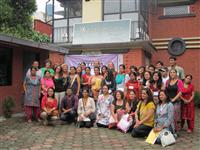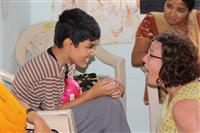ABC of NC Staffers Teach in Kathmandu
ABC of NC Child Development Center provides financial aid for qualified applicants from the entire Piedmont Triad. Specific funds are available for students from Guilford county from The Pratt Family Foundation and for students from Davie county The Davie Community Foundation. Please contact ABC of NC at www.ABCofNC.org for more information.
Two ABC of NC Child Development Center employees traveled over 8,000 miles to Kathmandu, Nepal in July to share the school’s renowned educational services with Nepalese teachers, families and government employees.
 ABC of NC, the largest school in North Carolina exclusively serving children with autism spectrum disorders, is located in Winston-Salem. Selene Johnson, executive director and Lizzy Donovan, senior educational consultant, traveled to Kathmandu July 7th through 22nd with Knowledge for People, a Seattle-based organization which focuses on outreach, education, and support for individuals and families with autism in developing countries around the world.
ABC of NC, the largest school in North Carolina exclusively serving children with autism spectrum disorders, is located in Winston-Salem. Selene Johnson, executive director and Lizzy Donovan, senior educational consultant, traveled to Kathmandu July 7th through 22nd with Knowledge for People, a Seattle-based organization which focuses on outreach, education, and support for individuals and families with autism in developing countries around the world.
The mission of ABC of NC includes providing support to families who would not otherwise be able to receive services for their children with autism. Since the school’s clientele is primarily located within the Piedmont Triad, this project provided the organization with its first opportunity to meet this mission on a global level.
“Autism knows no cultural boundaries, and it looks the same no matter where you are,” said Johnson.
Autism affects approximately one in 110 children worldwide with equal distribution among races, religious and national origins. Autism is diagnosed in boys four or five times more frequently than girls.
Johnson and Donovan were invited by Knowledge for People to join a group of United States autism professionals to further develop autism educational programs in Nepal, a developing country with no official recognition of autism as a developmental disability. The training occurred at the newly founded Autism Care Nepal (ACN), the country’s first organization to provide support and information for children affected by autism and for professionals who work with their families.
“There’s no doubt that I learned as much as I taught during the project. I am already a better person–and surely a better autism professional–for having had this international experience,” said Donovan.
 Working through a translator, Johnson and a speech-language pathologist from Portland, Oregon, organized a presentation for parents on communication skills for early learners with autism. Donovan and her training partner, an autism interventionist from Seattle, Washington, focused on social and play skills for children with autism.
Working through a translator, Johnson and a speech-language pathologist from Portland, Oregon, organized a presentation for parents on communication skills for early learners with autism. Donovan and her training partner, an autism interventionist from Seattle, Washington, focused on social and play skills for children with autism.
Johnson said, “The Nepalese parents were like sponges, soaking up the information and asking tons of questions. Just as in the US, parents were facing the same issues – ‘How can I increase my child’s vocabulary?’ ‘How can I get my child to eat consistently?’ ‘How can I get my child to sit with an activity for more than two minutes?’ ‘How can I get my child to stop biting her hand when she is upset?’ and on and on.”
Johnson and Donovan spent their two weeks in Nepal working directly with the parents of affected children to train them in basic intervention strategies such as teaching children to communicate their wants and needs, engaging children in meaningful social interactions, and instruction of basic self-help skills. Johnson reported that the children were fast learners with many obtaining new skills within 30 minutes of their introduction of the program.
”The families were so appreciative of every bit of information. A couple of the mothers even hugged me afterward,” said Johnson.
Donovan added that she “feels so honored to have been a part of the Autism Care Nepal project, and have returned home with a renewed energy to maximize the use of every resource we’ve got to help families affected by autism in North Carolina.”
The only drawback reported by Johnson and Donovan was driving between locations.
 “In a city that has around a million people, there are NO traffic lights, stop signs, police officers directing traffic, or road markings. It is complete chaos on the streets – but somehow it works. There were people driving various vehicles, pedestrians, dogs, and even cows, all sharing the same roads, with no obvious rules! We came closer to other cars than I ever could’ve imagined possible, and yet, we didn’t witness a single collision,” Johnson said.
“In a city that has around a million people, there are NO traffic lights, stop signs, police officers directing traffic, or road markings. It is complete chaos on the streets – but somehow it works. There were people driving various vehicles, pedestrians, dogs, and even cows, all sharing the same roads, with no obvious rules! We came closer to other cars than I ever could’ve imagined possible, and yet, we didn’t witness a single collision,” Johnson said.
For more information on Knowledge for People or Autism Care Nepal, please visit their websites:
Knowledge for People http://knowledgeforpeople.org/
Autism Care Nepal (ACN) http://www.autismnepal.org/
Captions:
First picture: Selene Johnson, front row, fourth from right, and Lizzy Donovan, back row, second from left, join autism professionals and parents in Kathmandu, Nepal in July to help found Autism Care Nepal.
Second picture: Selene Johnson reinforces Aaditya, a young boy from Nepal, who is learning to use sign language to communicate.
Third picture: Lizzy Donovan works on partner connection, with Padma, a five-year old girl from Nepal who was recently diagnosed with an autism spectrum disorder.
Sponsored by ABC of NC Child Development Center
